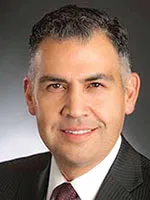Senior Reporter
Company Targets Old Drive-In Theaters for Truck Parking

[Stay on top of transportation news: Get TTNews in your inbox.]
A 40-year veteran of the trucking and transportation industry believes a business plan that he and a group of investors are formulating could help to ease some of the challenges related to the nationwide truck parking shortage.
Frank Sonzala’s idea has to do with using abandoned drive-in movie locations and other similar sites near big cities and converting them into secure, centrally located parking facilities, with nearby amenities including restaurants, bathrooms and showers and possible recreation sites.
Sonzala, the chief corporate development officer of San Antonio-based ConTrade Holdings, said the firm is in the fundraising stage of the plan, which he believes if fully implemented could provide 40,000-plus truck parking spaces.
“Trucking parking problems are a national safety concern,” Sonzala said. “This is an epidemic for the truck drivers to find a safe place to park at the end of their duty day. For every driver who finds a legal and safe place to park, we need 11 more parking spaces every day. Now we have about 360,000 legal parking spaces for the trucking industry and we need more than 3 million spaces.”

Sonzala
Sonzala says his company wants to establish a coast-to-coast network of parking locations, with a fixed top price of $26 per day near major cargo hubs, and he says the old drive-in movie locations are a starting point.
“Our goal is to build 100 of these facilities with 450 spots to start in areas where the congestion is the worst and there is the least amount of truck parking,” he said. “We are already searching out the locations we can buy. We are going to do this in a rapid format.”
Sonzala said his company is looking at several locations in Texas with the hope of having one location in operation late this year or early 2024.

The makers of Transport Topics’ updated Top 100 For-Hire Carriers list examine trucking’s shifting business environment and what it means for the supply chain. Tune in above or by going to RoadSigns.ttnews.com.
“There were once more than 8,000 drive-in movie theaters in the country, now we have 321. They’re between 14 and 15 acres. They have water, electricity, and they’re zoned properly. I know there are 18 of these sites on Interstate 10 between California and Florida,” Sonzala added. “When we build 100 of these, with 450 spots per facility, we will have only solved about 20% of the problem.
At 2,450 miles, I-10 is the fourth-longest highway in the U.S., stretching from the Pacific Ocean and Santa Monica to the Atlantic Ocean and Jacksonville.

Esparza
“I drove by one of these locations recently near Lubbock, Texas, and me and my family went by an old movie theater location, where I took my wife on our first date,” Texas Trucking Association CEO John Esparza said. “I said to my son I think they’re going to turn that into some sort of a truck parking facility. The private sector is going to have to help get it done. We need to get it done, and let’s let the private sector do it. We’re set up for that, and we cannot rely entirely on the states alone to solve our parking challenges.”
The federal government is expanding its involvement in truck parking, recently announcing plans to allocate more than $750 million over three years for a wide variety of projects. The Department of Transportation last month awarded $33.5 million in RAISE grants to build truck parking facilities in Texas and Louisiana. In freight-heavy Florida and Tennessee, $37.6 million was designated last year for projects.
Plans for the Texas plaza between Austin and San Antonio, in the northwest quadrant of Texas state highways 130 and 80, call for 20 short-term and 100 longer term spots with security lighting and fencing, limited entrances and exits, and a rest stop that would include showers and restrooms.

Sullivan
Bill Sullivan, American Trucking Associations’ executive vice president for advocacy, said solving the truck parking shortage will take the efforts of governments on the local, state and federal level along with the private sector, and take years to complete.
“We have only begun to see at the federal level grants that specifically target truck parking, which is welcome,” he said. “From an ATA national perspective, policymakers have now turned their attention to this in a major way and we see hope.
“We are a market-based country and so much of this depends on land, and governments will only be able to do so much. The problem is big enough, and private solutions likely have a role to play.”
Sonzala said he realizes some in the industry may object to the fact that his company seeks to charge truckers to park and that this venture could be viewed as competition with the truck stop and travel plaza industry.
“We’re not planning to enter into the fuel and restaurant business,” he said. “What we’re trying to do is be the best in the truck parking business.”
Want more news? Listen to today's daily briefing below or go here for more info:




